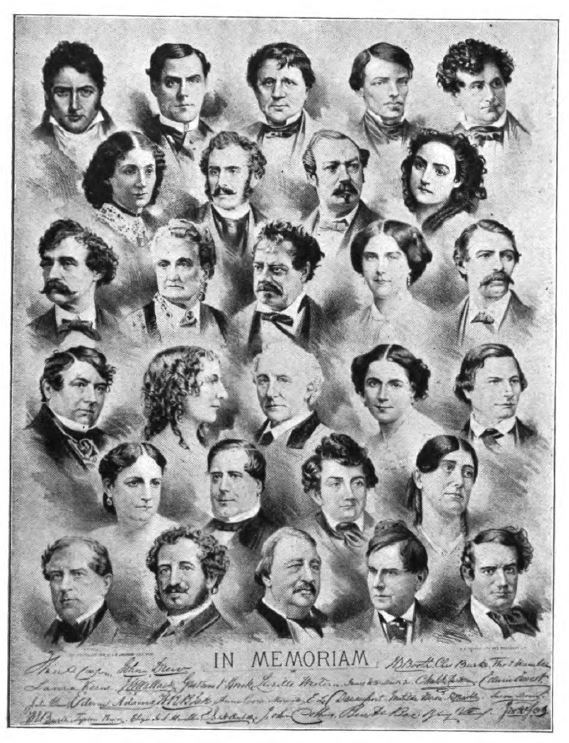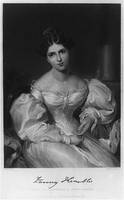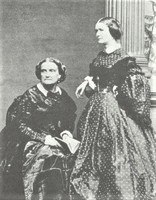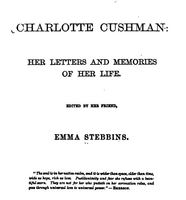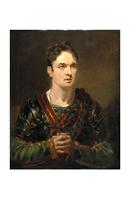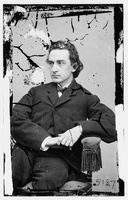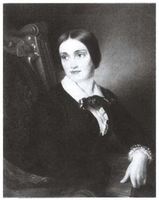Dublin Core
Title
Strang's Players and Plays of the Last Quarter Century (1902)
Subject
Cushman, Charlotte Saunders, 1816-1876
Actors and Actresses
Actors and Actresses--English
Actors and Actresses--US American
Stebbins, Emma, 1815-1882
Macready, William Charles
Criticism
Citation of Named Entity
Gender Norms
Relationships--Networks
Description
Strang deems Stebbins's biography of Charlotte Cushman to be untrue in parts. Strang gives a detailed account of Cushman's performances and describes Macready as a decisive factor in Cushman's career, the major career boost.
Credit
Source
L. C. Page & Company, 1902
Publisher
L. C. Page & Company
Date
1902
Type
Reference
Auto/Biography Item Type Metadata
Text
"Unfortunately for himself, and for many that had intimate relations with him, Forrest never learned the value of the soft and conciliatory answer. Always he was the rabid, unprincipled, irresponsible partisan" (74)
"the disgraceful squabble with Macready." (75)
"Charlotte Cushman has always been to me a creature of mystery, though exactly why, I cannot say. Certainly the facts of her life and career are straightforward and simple, even prosaic. Yet, as regards Charlotte Cushman herself, I always have been and am still puzzled, dissatisfied, and undecided. She was the first great American actress. That much is plain; but is it true, as it is so often claimed, that she has never been rivalled on the stage of this country? As regards the potent spell of her personality, there can be no dispute, for scarcely a critic writes of her in cold blood and with satisfactory analysis. Still, how came it that this marvel of person ality grew out of even-tempered and strictly conventional New England? To be sure, neither New England nor New York, for that matter, had any notion that she was a genius until England discovered it, for Charlotte Cushman was simply the “utility woman ” of a New YOrk stock company, when William Charles Macready magically aroused her and sent her abroad to conquer the same London, which would not receive the Amer ican Forrest, already accounted a great actor in his own country." (98-99)
"In 1839, she again acted Meg Merrilies, but it was not until she returned from her first English triumph that her playing of this character really attracted attention in the United States. Miss Stebbins, in her biography of Charlotte Cushman, relates very circumspectly how Miss Cushman’s concep tion of the part came to her as an inspiration, and declares that the effect of Miss Cushman’s acting was so great and so unexpected that the English tenor, John Braham, who was singing Henry Bertram (for “Guy Manner— ing” at that time was a real melodrama, a combination of music and drama), was nearly overcome at the sight of her. Miss Stebbins thus grandiloquently described the moment: “As she stood at the side scene, book in hand, awaiting her moment of entrance, her ear caught the dialogue going on upon the stage between two of the gipsies, in which one says to the other, alluding to her, ‘Meg,— why, she is no longer what she was; she doats,’ etc., evidently giving the impression that she is no longer to be feared or respected, that she is no longer in her right mind. With the words a vivid flash of insight struck upon her brain. She saw and felt, by the powerful dramatic instinct with which she was endowed, the whole meaning and intention of the char acter; and no doubt from that moment it became What it never ceased to be, a powerful, original, and consistent conception in her mind. She gave herself with her usual con _ centrated energy of purpose to this concep tion, and flashed at once upon the stage in the startling, weird, and terrible manner which we all so well remember. On this occasion it so astonished and confounded Mr. Braham— little accustomed heretofore tO such manifesta tions—that he went to her after the play to express his surprise and admiration." There seem to be, however, two very excel lent reasons for doubting the truth of this interesting story. In the first place, there is no record to show that Braham appeared in “Guy Mannering” during the engagement referred to. In the second place, Miss Cush man was not at the Park Theatre, New York, while Braham was singing there, but in Philadelphia." (102-103)
"During the winter of 1842—43, Miss Cushman managed the Walnut Street Theatre, Philadelphia, and the follow ing fall she came under the influence of the finely rounded art of Macready, an influ ence that was literally the making of her" (105)
"From Macready, Charlotte Cushman obtained her first notion of what finished acting really was. Indeed, from him she learned practically all of the art of acting that she ever knew. After playing with him, she began to develop authority, whereas before she had possessed merely crude, unformed, and uncon trolled dramatic talent. He inspired her with something of his own spirit of conscientious labour, and he inflamed her ambition, banish ing for all time the deadening condition of quiescent self-satisfaction that had temporarily clogged her advancement. In December, 1843, at Macready’s request, Miss Cushman appeared at the Park Theatre, New York, as Evadne to his Melantius, as Beatrice to his Benedick, and as Angiolina to his Marino Faliero in Byron’s “ Marino Faliero,” and after that she played an engagement with him in Boston." (106)
"Directly due to Macready also was Miss Cushman’s decision to go to England, and on October 25, 1844, she gave a farewell perform ance at the Park Theatre, New York, as Beatrice in “Much Ado About Nothing.” It was suggestive, as showing of what compara tively small moment this event was to the public at large, that the house was both small and plainly disappointed in her acting. Her first London appearance was on February 14, 1845, as Bianca in “Fazio,” and she was re ceived with unusual enthusiasm. Then she acted Lady Macbeth to the Macbeth of Edwin Forrest so successfully that after that night the two were never again friends." (107)
"Miss Cushman’s capabilities in the portrayal of masculine character found their best expression in Romeo and Cardinal Wolsey. This latter part was acted at a time when it was quite the fashion to praise every thing that Charlotte Cushman did, and accord ingly her Cardinal Wolsey was praised. Yet, from the fact that no especial account was taken of it by her biographers, one may draw the conclusion that it made no extraordinary stir. Her Romeo, on the contrary, was ac counted a decidedly effective impersonation. At least one experienced critic called it the best Romeo that he ever saw, making a single reservation in favour of the balcony scene as given by Ernesto Rossi. This superlative esti mate Of Miss Cushman’s Romeo, which one is at first inclined to reject as absurd, be comes more tenable upon consideration. Let one ask himself how many male Romeos he has seen, who 'have really impressed him es pecially in the part, who were entirely satis factory, who made themselves fixtures in his memory. There is scarcely a single one. There is, in truth, something very feminine —not effeminate, mind you — in the romance and the ethereal idealism of Romeo’s love; and it is quite believable that a woman like Miss Cushman might have formulated in her femi nine thought, and represented with her mas culine face and figure, a Romeo in whom the seeming contradictions and rare subtilties of the character were perfectly reconciled and realistically revealed." (111-112)
"Charlotte Cushman, on the contrary, presented a Lady Macbeth that was more man than woman; and she had, more over, a theory, which she claimed could be proven by the text, that both Macbeth and his wife were drunk when they murdered Duncan." (113)
"John Gilbert (1810—1889) was born in Boston on Richmond Street, in the house next to that in which Charlotte Cushman was born; and as boy and girl these two famous actors were playmates." (253)
Location
Boston, MA, US
Geocode (Latitude)
42.3602534
Geocode (Longitude)
-71.0582912
Social Bookmarking
Geolocation
Collection
Citation
“Strang's Players and Plays of the Last Quarter Century (1902),” Archival Gossip Collection, accessed July 3, 2024, https://archivalgossip.com/collection/items/show/278.


